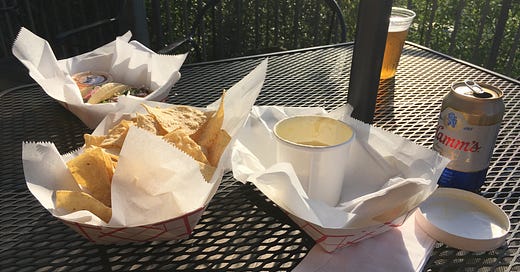Neighborhood bar inspires local Libra to question self
Musings on a problem I haven't yet solved
Disco Diaries is a free series of essays and vignettes. If you love it, consider sharing it with a friend, or supporting this project financially. For $5 a month, you’ll receive a monthly personality quiz (see here and here for examples), as well as my eternal gratitude.
In my mind’s eye, the Comet shines dim and seductive, like a red light bulb plugged into a midnight blue room. Neon-framed windows make its black and white checkered floor look pink. Its barstools sit stoically prepared to host secrets, laughs, and drama.
The Cincinnati dive bar is an endearingly non-venue venue. It’s an important destination for multiple milieus. Bikers gather there on Tuesdays. Bluegrass happens on Sundays. A comedy series fills up Saturday nights.
The performers—as many of you have seen first hand—stand in front of the windows at the end of an ordinary, rectangular room. There is no stage, and the sound system is bad. A show comes together like a youth center open mic, DIY but fiery and essential.
I learned my band manners at the Comet. When I was 19 my sister took me there for tofu quesadillas. Later in college, I drove two hours to watch my friend’s band play there. When I joined that band years later, I landed right back in the arms of the Comet.
At the time, I had bad imposter syndrome. It had 40% to do with my musical skills, and 60% to do with fitting in. The scene was its own thriving entity. Touring bands came through regularly, friend groups huddled around bar stools, and everyone had cooler pants than me.
Any time I’ve felt out of place, my chameleon instincts kick in. I begin to look for cues to follow, hoping someone else’s actions can provide an outline for my own. This is, I guess, not that weird. But it’s a longstanding habit I wish I’d drop.
In middle school, it meant buying the same graphic t-shirts as my year-older friend. At the Comet, it meant gravitating towards the bar.
When my friends and I would enter the Comet, we’d immediately drift to the left. From there you can see the canned beer selection, and have a clear view of the length of the bar and its occupants. Then you order—maybe a burrito, definitely a beer. Probably one from the cheap shelf. Fisting a Hamm’s or a Black Label provides a sense of belonging.
There is nothing wrong with this ritual. It’s lovely, in fact, to look back on the dozens of occasions I had to meet a friend and begin our evening ordering drinks and food. And it’s obviously not unique to any bar space. Ordering a drink is what you do.
Somewhere along the way, though, I lost my sense of intention. I found that my actions—drink orders and otherwise—were coming from a place of duty, not choice. It was the me I had presented once, and therefore the me I needed to maintain.
The more you repeat an action, the more it seems like who you are. Sometimes when you change it, people struggle to redefine you in their personal context. Even I struggle to redefine myself.
I have spent many nights out filling a role that was already written. If I don’t define my own values and priorities with every outing, I’ll keep sopping up someone else’s.





